
Thank you for joining us for the Intro to SEO and Google Analytics Workshop!
If you'd like more information about our programs, please feel free to send an email to hello@grandcircus.co!
Overview
- Day One - Tuesday, June 27
- Workshop Introductions
- What is SEO?
- SERPs
- Your Site - Plus Activity!
- Link Building
- Social Media & The Searcher
- Black Hat, Local and Other Goodies
- Homework!
- Day Two - Thursday, June 29
- Homework Review
- Intro To Google Analytics
- Your Goals
- Walkthrough
Workshop Introduction
Intro to SEO and Google Analytics is a starting workshop for people with no or little SEO knowledge or experience. You may also be overwhelmed or intimated by the idea of "SEO." The thought of logging in to Google Analytics might make you sweat and the idea of tracking traffic and clicks is scary, too.
But that's okay! That's why we are here!
Workshop Introduction
This workshop will help you:
- Gain a basic understanding of SEO, what it is and best practices
- Arm you with tools and resources to start SEO-ing (that's a verb, right?)
- Fall in love with Google Analytics
- Return to your business with the tools to start tracking your online successes
Introductions!
Leah Yanuszeski
LinkedIn: https://www.linkedin.com/in/leahyanuszeski
Email: lyanuszeski10@hotmail.com
(please do keep in touch!)
Now You!
Enough about me:
-
Who are you?
-
What do you hope to get out of this class?
-
Favorite beverage?
So, what is SEO?
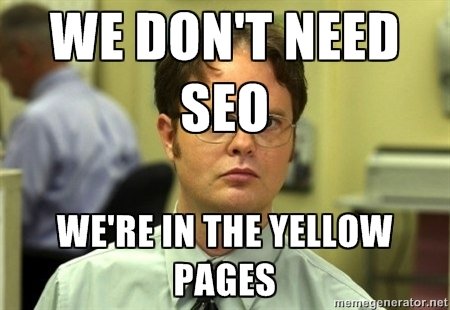
SEO (Search Engine Optimization) is the practice of driving high-quality traffic to your site by ranking at the top of the search engines organically, thanks to employing different tactics and strategies.
Breaking down a SERP
(Search Engine Results Page)
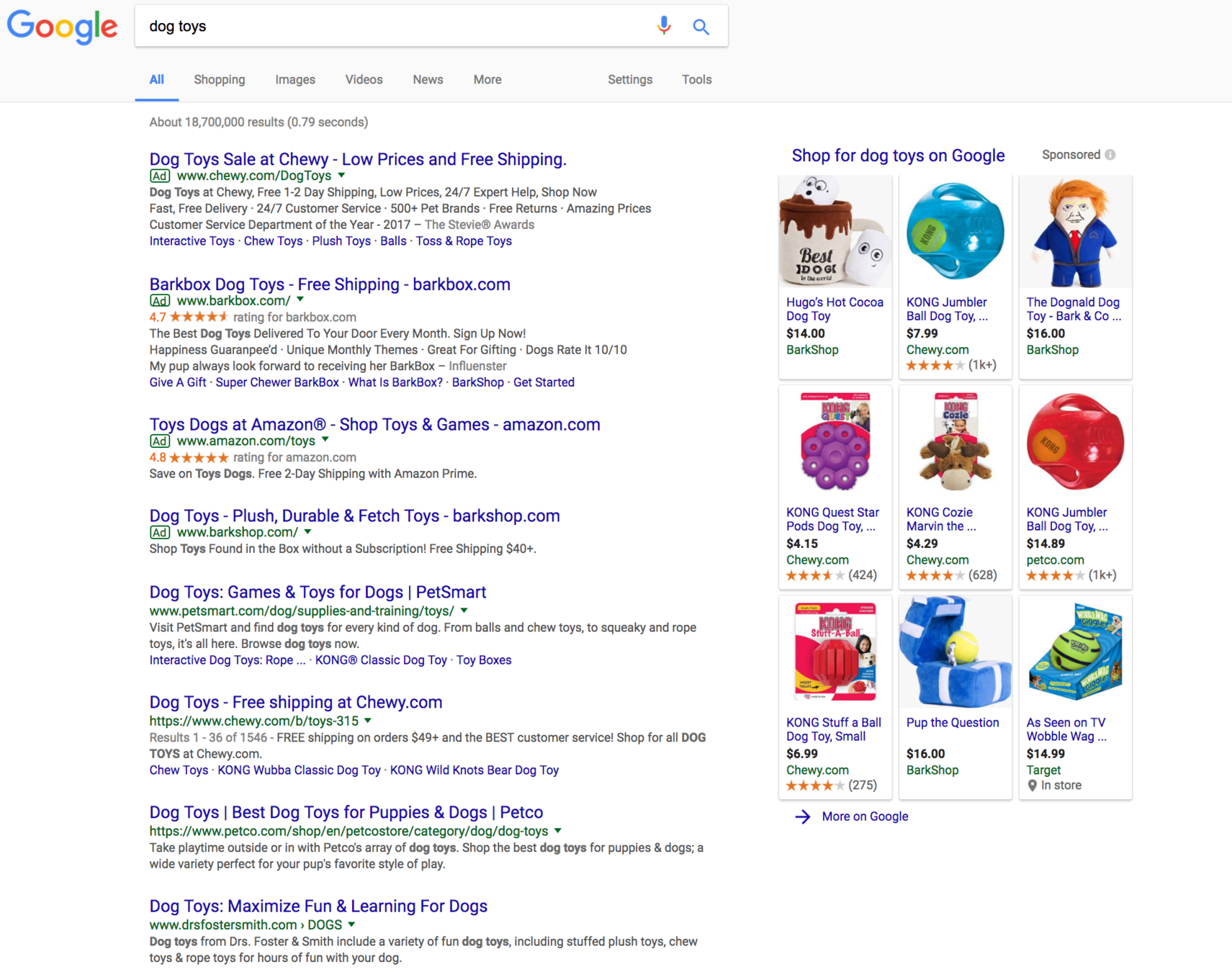
Breaking down a SERP
Before we dive deep
Google updates it algorithm often! (We might argue too often)
Because they are constantly improving
their search engine for the user (and make
money).
Google sometimes announces when they
make an update to their algorithm, but
make sure to keep an ear to the SEO
community to hear how it's impacting sites.

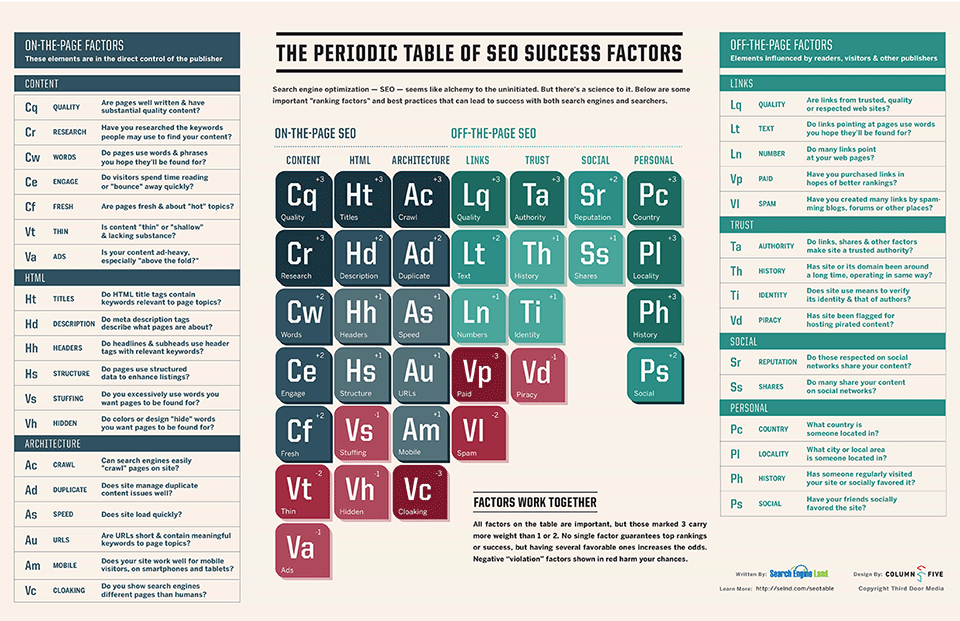
Courtesy of http://searchengineland.com/seotable
Your site itself
What is on your site and how it's built plays a huge role in your site's ranking. These factors include:
- Content, content, CONTENT!
- Metas, titles and keywords
- Image optimization
- Internal and outbound links
- Other items you might need a developer brain for
Content
Did I mention how important this is? We promise it's important...
- Don't keyword stuff.
- Think about what your audience would want to know (and what they're searching for).
- Write quality copy. Google likes to see upwards of 500-15000 words per page, but don't keyword stuff.
- NO KEYWORD STUFFING. STOP IT.
Did we mention quality content?
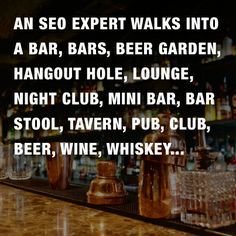
Content, metas & such
While writing the copy for your webpage, make sure to remember the following:
- Keyword Research (do this!). It's important that each page relates to one keyword, and the copy follows suite.
- Use Google Trends, Plugins, 3rd Party Research, Keyword Planner tool on AdWords, etc.
- Dependent on many factors including competition, search traffic, location, current ads, seasonality...
- Optimize your page's Title and Meta tags.
- If you're on WordPress, this is super easy.
What is a title & meta?
(You might ask?)
So, when I search for "Dog Toys"...
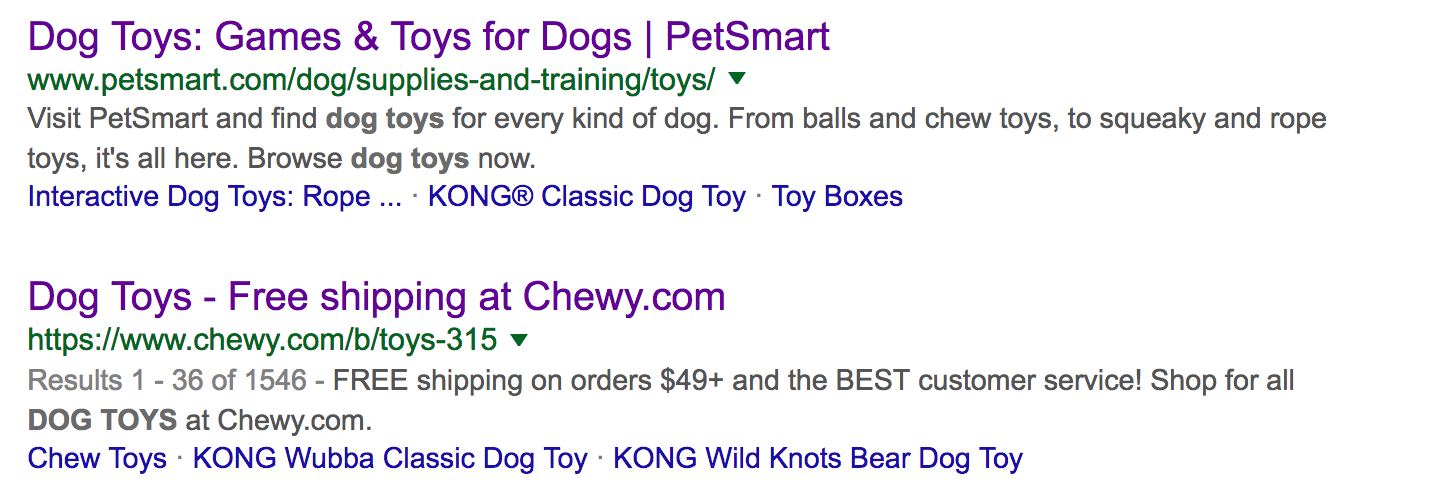
Image optimization
Images are important! But you have to optimize those too. Make sure to name the images:
- Title/File Name: Use dashes in-between words and use a relevant name.
- Alt (or Alternate) Text: This should explain what the image is. Just adding normal spaces will do.
- Caption and Description optional (but highly recommended).
Remember to add relevant, quality images. But don't add photos meant for a billboard--adding many of those will slow your site down.
https://yoast.com/image-seo/
Image optimization
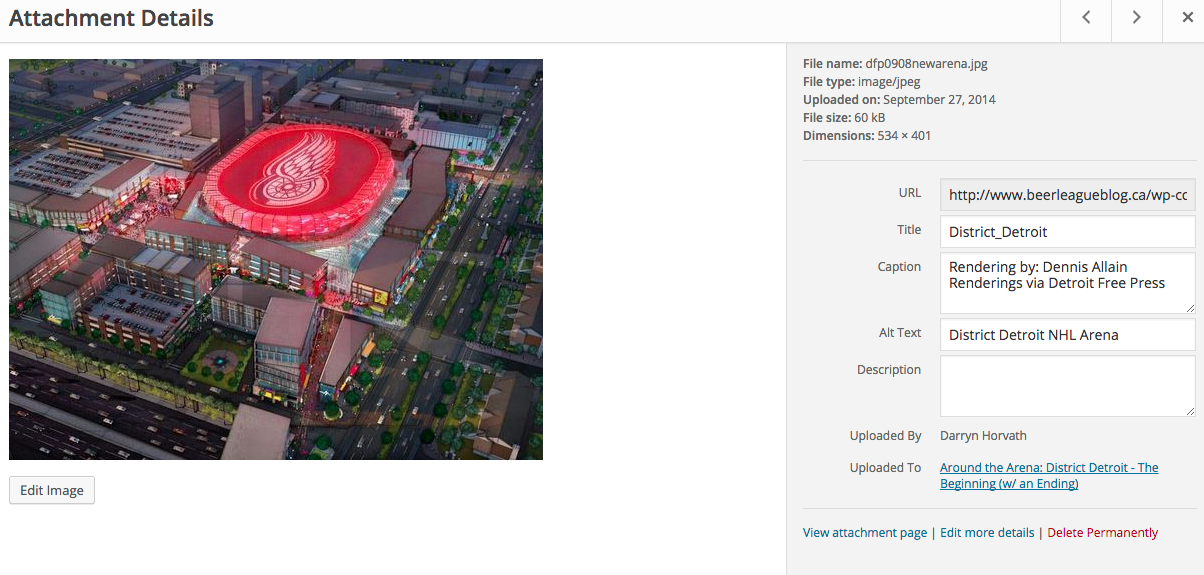
Internal & outbound links
Three types of links covered today:
Internal: Links connecting content within your site
Outbound: Links connecting your readers to other sites
Inbound: Links pointing to your site from another
And the techy items: **Developer optional
Google also looks for:
- An XML sitemap that's easy to crawl (there's a plugin for that)
- Schema Data (more microdata for search engines to read)
- An SSL certificate
- A responsive site
- Google Analytics and Webmaster Tools
- A fast website (Page Speed Insights)
Group Activity!
Find a partner across the room!
- Your business: office supplies
- Figure out titles, metas and keywords for the business' top three products (you pick products)
- Then we'll pick the best ones!
Link Building (Inbound)
One of the oldest (and arguably) best ways to improve your site's ranking.
Many consider this "link building," but others like to consider "link earning." Be friends with the latter.
Can be done through:
- Blogging (back on the content wagon)
- Blogger/social outreach and identifying brand ambassadors
- Social sharing and engagement
- Forums
Be careful, good friends
This is where it gets tricky. Link building might seem easy, but if done incorrectly can cost your site.
Link building is an art. Wait, it's definitely a science....maybe some luck?
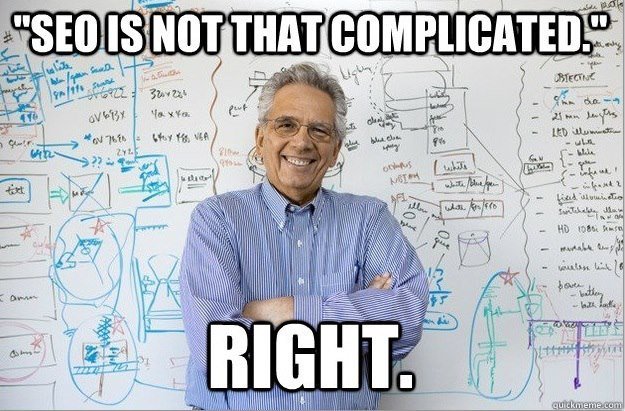
Your social presence
Social Media plays will continue to play an increasingly bigger role in your site's SEO.
This includes:
- The reputation and following of your channels
- The number of shares and comments on your posts (theoretically, you're posting your great blog posts on social, right?!)
- The social networks that are pointing to your site (think inbound links, but on social media)
- Frequency of posts
Google Loves Twitter
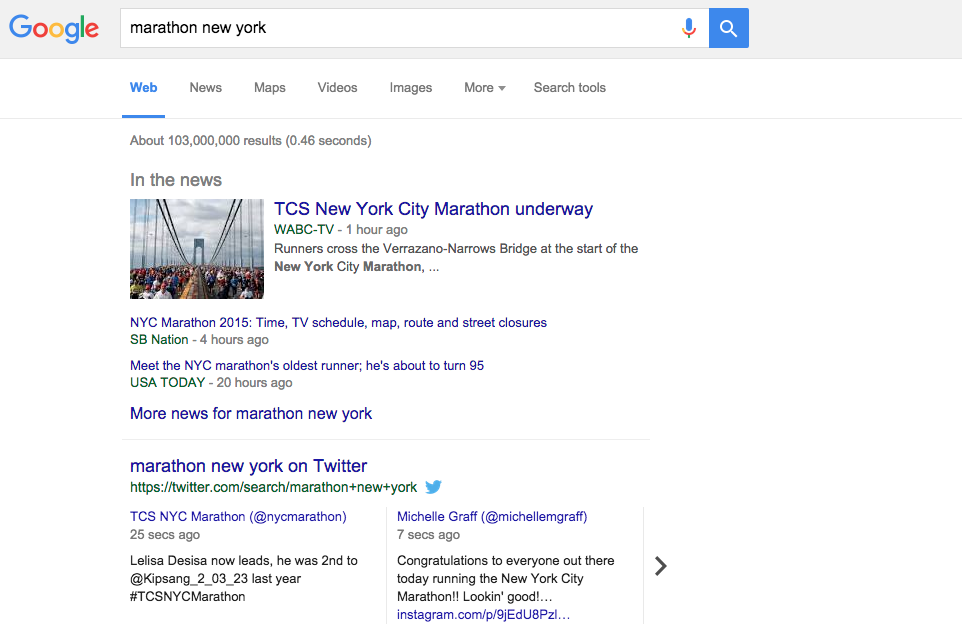
The all-powerful searcher
At the end of the day, it's all about your searcher. If your site is not converting (whatever a conversion may be), then what's the point?
Really, Google's algorithm, continual updates and the industry's preaching of "SEO" is for responsible web-making. Meaning we need to make the web a better place for searchers (and cat memes).
Black hat SEO v. White hat SEO

If what you're doing gives you a bad feeling in your gut, then you should probably stop, right? (True in most cases, minus pizza.)
Local search
Instead of searching for dog toys, we'll search for a...
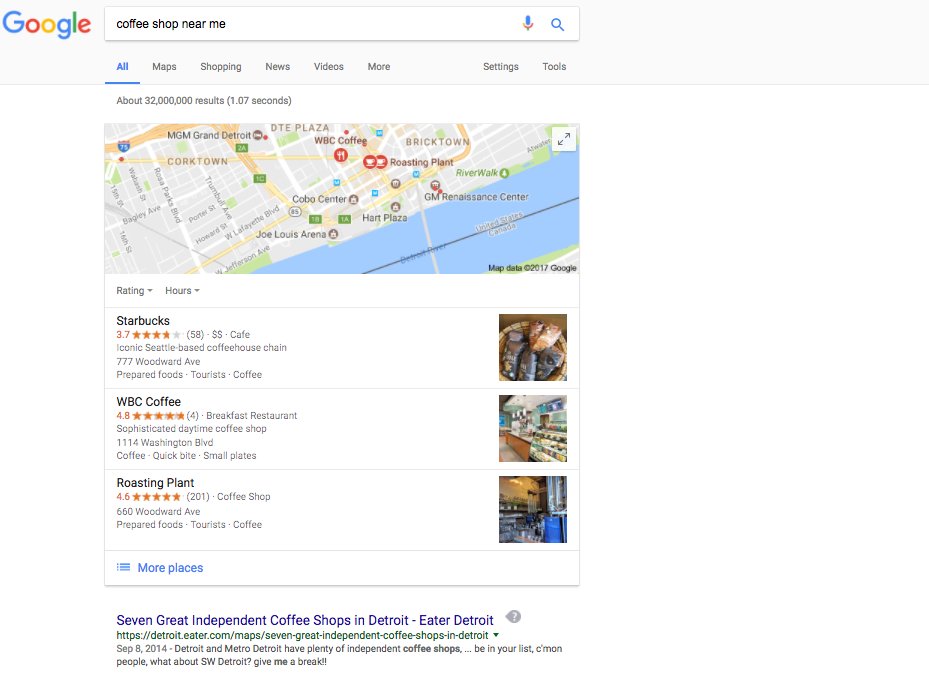
What that means
Instead of just displaying a normal SERP, we get the highlighted box that shows business that may apply, near our vicinity.
- Relies on a user's location
- May look different depending on search engines and actual search
- Sometimes shows images at the top of the SERP, a map of locations on the side, a list with markers, etc.
How to rank locally
Practicing proper SEO tactics will improve both your site's ranking and local search results. However, there are a few things you can do:
- Register all locations of your business on trustworthy directories (Yelp, Foursquare, TripAdvisor--whatever may apply).
- Make sure you have appropriate an Google My Business page(s), showing your location.
- List all locations on your website.
- Encourage your audience to review your business!
- Citations.
- Adding geographical markers in your metas & titles.
A citation...
"A citation is any mention of your business out on the web, with or without a link. It can come in various forms:
- Company name, by itself.
- Company name & phone number.
- Company name, phone number & address.
- Company name, phone number, address & link.
...Even just the phone number itself can be a citation... A complete citation should include the company name, address and phone number. A citation that does not include all three of these is sometimes referred to as a partial citation." -Darren Shaw
Homework!
- Pick a business (either yours or a different one)
- Look through their web presence
- Develop a content strategy
- Things to think of:
- Improving titles, metas, tags
- Blogging
- Ambassadors
- Influencer outreach
- Social
- Things to think of:
Bring your strategy to discuss next class!
See y'all on Thursday!
Questions!?
Intro to SEO and Google Analytics
By Leah Yanuszeski
Intro to SEO and Google Analytics
- 266




